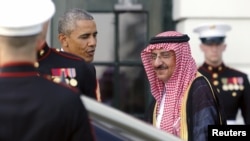U.S. President Barack Obama says the United States and Saudi Arabia have an “extraordinary friendship” that dates back to former U.S. President Franklin Roosevelt, more than seven decades ago.
President Obama hailed U.S.-Saudi ties as he welcomed Saudi Crown Prince Mohammed bin Nayef and Deputy Crown Prince Mohammed bin Salman for talks at the White House Wednesday, a day before the summit with leaders of the six-nation Gulf Cooperation Council nations at Camp David, Maryland.
The gathering began late Wednesday with a dinner at the White House. The summit continues on Thursday at the presidential retreat north of the U.S. capital.
Obama administration officials this week dismissed talk of a snub by Saudi Arabia, after Saudi officials said King Salman would not be attending the summit as planned. Of the six GCC countries, only the emirs of Qatar and Kuwait are attending. Bahrain, Oman, the UAE and Saudi Arabia are sending senior officials.
Cease-fire discussion
During remarks in the Oval Office ahead of talks, the president told reporters the U.S. and Saudi Arabia are continuing to build their relationship “during this very challenging time.” He said the leaders discussed the situation in Yemen, including building on the cease-fire in that country.
Obama also noted the kingdom is a crucial component in the fight against the Islamic State militant group in Iraq and said his work with Crown Prince Mohammed on counterterrorism has been critical to "not only maintaining stability in the region, but also to protecting the American people."
The crown prince conveyed a message from King Salman, saying the Saudi ruler attaches “great importance to the strategic, historic relationship between our two countries.”
The crown prince told Obama, “we look forward to working with you to overcoming the challenges and bringing about calm and stability to the region.”
Reaffirmed commitment
Saudi Arabia announced Sunday that King Salman would not take part in the two-day summit. Foreign Minister Adel al-Jubeir cited the summit's overlap with a five-day cease-fire and humanitarian effort in neighboring Yemen where Saudi Arabia has led a campaign of airstrikes against anti-government fighters.
Even before the announcement the Saudi king would not attend, there was talk about Gulf nations’ worries about U.S.-led efforts to negotiate a nuclear deal with their rival, Iran.
Obama invited the GCC nations -- Saudi Arabia, Kuwait, Bahrain, Qatar, the United Arab Emirates and Oman -- after six world powers reached a framework agreement with Iran that would give Tehran sanctions relief for reining in its nuclear program.
White House Press Secretary Josh Earnest said Wednesday the United States values its security cooperation with the GCC.
“The national security of the United States is enhanced by the strong counterterrorism and intelligence sharing relationship that we have with each of these countries,” he said. “What’s also true is that United States’ support for their security is critical to their very existence. And they understand that the strong relationship with the United States is one that is worth investing in, and one that is worth maintaining.”
The White House spokesman said the Camp David summit also will focus on regional stability including the conflicts in Syria, Yemen, and any concerns Gulf nations may have about Iran's behavior.
“There will be a discussion about how the president believes the best way for us to prevent Iran from obtaining a nuclear weapon is through diplomacy. And the president believes it’s clearly in the best interest of the United States, but he also happens to believe it’s in the best interest of GCC partners too, and that influences his commitment to trying to reach this agreement,” said Earnest.




